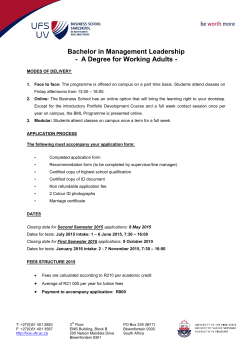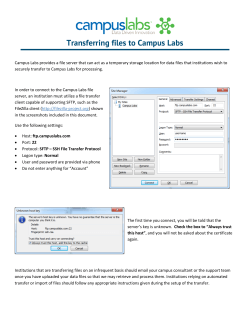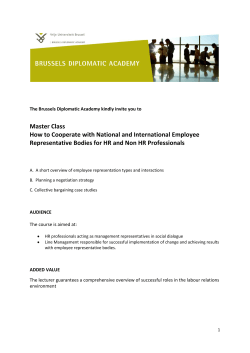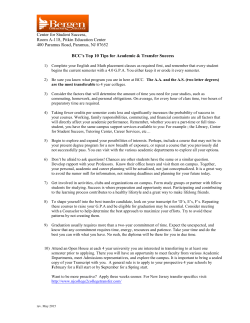
Report of Recommendations - Imagine DU
STUDENT ACCESS AND SUPPORT TASK FORCE Report of Recommendations CONTENTS Introduction ................................................................................................................................................ 1 Recommendations with Greatest Potential Impact ............................................................................... 1 Complete List of Recommendations........................................................................................................ 2 Financial Aid .................................................................................................................................. 2 Access Programs ............................................................................................................................ 2 Support Programs ......................................................................................................................... 2 Connecting Access and Support Programs................................................................................ 3 Mentoring, Advising, and Career Development ....................................................................... 3 DU Campus Space......................................................................................................................... 4 Overall Recommendations .......................................................................................................... 5 Members of the Student Access and Support Task Force ..................................................................... 6 INTRODUCTION The Student Access and Support Task Force was charged with reviewing recently completed campus reports to identify recommended actions related to the student experience at the University of Denver. Upon review, the task force found the majority of its recommendations in the report of the Strategic Planning Steering Committee. After identifying themes among the recommendations, the task force invited a select group of members of the DU community to participate as panelists in order to learn more details about the student and faculty experience and the programs already in existence related to student access and student support on campus. Following is a list of recommendations resulting from this review of documents, enhanced by the more detailed understanding that came from the panel sessions. All recommendations are presented within the identified themes of financial aid, access programs, support programs, mentoring, advising and career development, and DU campus space, with overall recommendations presented at the end. RECOMMENDATIONS WITH GREATEST POTENTIAL IMPACT In addition to organizing the recommendations by thematic area and length of time for implementation, the task force members also identified the recommendations we believe have the potential to make the greatest impact on student access and support: Expansion of need-based financial aid for students Diversification of the faculty Centralized coordination of student access and support programs, including an inventory of campus programs, evaluation of their impacts, and consideration of expansion of funding and resources for those programs that are most impactful A student-centered focus to campus, including a philosophy that leads employees to personally direct students to resources, and a coordinated student persistence effort Exploration and development of an enhanced advising and registration system Development of a map of career development 1 COMPLETE LIST OF RECOMMENDATIONS FINANCIAL AID Short Term Centralize gift and endowed financial aid funds Medium Term Develop a program for improving students’ financial literacy that begins at the point of admission and follows the students through their career by embedding it into the lives of students, potentially by including it in the enhanced advising program and as part of the first year undergraduate student program Long Term Raise additional unrestricted funds for student aid and consider approaching donors of currently restricted funds to remove restrictions for more flexibility ACCESS PROGRAMS Short Term Medium Term Inventory access programs across DU and consider increased funding for those that lack funds and/or have a large/important impact Remove the roadblock of internal recharge – charging access programs for room reservations on campus puts undue burden on their small budgets Centralize access programs so the relevant staff work together and leverage resources SUPPORT PROGRAMS Short Term Inventory support programs across DU and consider increased funding for those that lack funds and/or have a large/important impact Expand support for IRISE program to enhance research opportunities for students and faculty related to the study of diversity and inclusive excellence Hire or assign to a current employee(s) the role of persistence program coordination, with responsibilities for identifying and contacting students who do not return, but show potential for return, and coordination of other persistence efforts related to currently enrolled students. Provide this coordinator with a clear objective, data, resources, and the authority to coordinate persistence efforts 2 Medium Term Define and develop a first-year undergraduate student program centered on student success Challenge student groups to develop a cross-group plan built into the student activities structure to tackle the issues of: o Lack of a welcoming environment for visitors to campus o Sexual assault prevention and treatment o Alcohol/substance abuse prevention and treatment CONNECTING ACCESS AND SUPPORT PROGRAMS Short Term Inventory current campus meetings related to student access and support: o Expand invitations o Consider additional meetings that will assist staff and faculty in coordinating campus efforts around access and success Long Term Develop a unified goal around access and support at DU through the creation of a diversity plan, including: o Set specific, measureable compositional diversity goals, with a first step of racial and ethnic diversity, for campus constituents, including students, faculty, staff, and administrators with a timeline, plan for achieving these goals, dedicated resources, and benchmarks with accountability o Conduct regular collection of inclusive excellence data related to DU community member’s perceptions of the campus climate for diversity and inclusivity, share the data widely throughout the campus community, and set goals for climate improvements including a plan for achieving these goals, dedicated resources, and benchmarks with accountability MENTORING, ADVISING, AND CAREER DEVELOPMENT Short Term Inventory peer mentor programs across DU and develop coordination of efforts to expand opportunities Expand the program that pays DU students who commit to unpaid internships Review the use of internship funding on campus, such as the Taylor funds, to ensure all available funding is being utilized 3 Medium Term Long Term Evaluate and consider expanding the engaged learning portfolio system (a pilot program exists) Increase accessibility to the Career Services Strength Finders assessment by ensuring all first-year undergraduate and graduate students are able to complete the assessment at no cost Expand alumni involvement in the career development process of DU students through collaboration between Alumni Relations and Career Services Explore and develop an enhanced advising and registration system that will better identify students at risk, including exploration of technological systems, how they can best be utilized, and how DU employees can interact with them for best results o Solicit feedback from students on how they solicit and receive information on advising and registration o Solicit feedback from faculty members on their levels of comfort advising and mentoring on various topics/issues o Audit current technical tools, including who is trained in the tools and how, and who uses the tools and how successfully o Post-audit, consider enhancing technical systems by exploring options available in current systems, and potential addition of new systems and tools, such as live chat advising Create a map of career development DU CAMPUS SPACE Short Term Develop a culture of access to support by educating and training DU employees to walk students to support offices when referring them there Long Term Renovate Driscoll to provide a true student and community space on campus, including a Student Success Center Develop a space plan that includes large spaces for gathering the entire DU community and small spaces for group meetings 4 OVERALL RECOMMENDATIONS Short Term Medium Term Expand information gathering from students to inform access and support efforts, including expansion of the exit focus group process that pairs with the annual alumni survey; share these data widely, particularly with those coordinating access and support efforts Conduct intentional review of “special projects” and pilot programs, including evaluation of their success, so they do not get lost in the hierarchy and those that show promise are able to obtain resources they need to continue and expand Explore and define the campus culture and student experience at DU, including an exploration of how does, or doesn’t, “public good” fit into this cultural identity o Move beyond articulating cultural descriptors to living these descriptors through purposeful actions on campus o Explore what it is that we value as a DU community o Define the University’s promise to members of its community o Extend the relationship with the University beyond students’ enrolled time on campus to increase involvement of alumni in the campus community 5 MEMBERS OF THE STUDENT ACCESS AND SUPPORT TASK FORCE Gina Johnson, Co-Chair – Executive Director, Institutional Research & Analysis Tom Willougby, Co-Chair – Vice Chancellor, Enrollment Uriel Berrum – Undergraduate student Bill Cross – Clinical Professor, Morgridge College of Education Ryan Gildersleeve – Associate Professor, Morgridge College of Education Jennifer Karas – Associate Provost, Undergraduate Academic Programs Johanna Leyba – Assistant Provost, Center for Multicultural Excellence Albert McClure – Graduate student Linda Quintanar – Director, Volunteers in Partnership (VIP) Program Catherine Smith – Professor and Associate Dean, Sturm College of Law 6
© Copyright 2025











